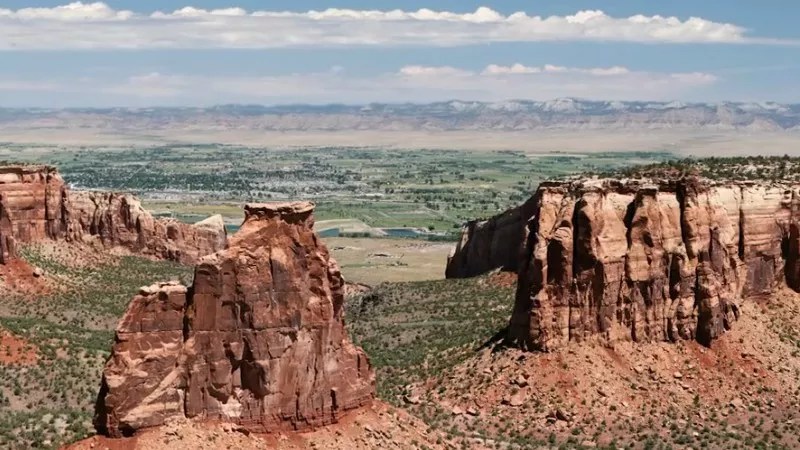

Audio By Carbonatix
A new report argues that support for public lands was a big reason that so many conservation-minded candidates in Colorado and the West won big in the 2018 election, and that taking a similar approach is a recipe for victory in 2020, regardless of a hopeful’s party affiliation.
Here’s how Jen Rokala, executive director of the Denver-based Center for Western Priorities, summarizes the organization’s “Winning the West: Election 2018”: “We found that voters in the West, regardless of whether they were a Democrat, a Republican or an unaffiliated voter, supported protection and access to public lands – and that candidates for office who supported protection of public lands didn’t lose their base whether they were a Republican or a Democrat.”
Of course, many Democrats in the West have made their love of public lands a part of their brand. Take Senator Michael Bennet and Congressman Joe Neguse, who on Friday, January 25, introduced the Colorado Outdoor Recreation and Economy (CORE) Act. A release about the measure notes that it “protects approximately 400,000 acres of public land in Colorado, establishing new wilderness areas and safeguarding existing outdoor recreation opportunities to boost the economy for future generations.”
As for Colorado politicos identified in the report as using this strategy to their advantage, they include Attorney General Phil Weiser, even though 18th Judicial District DA George Brauchler, his opponent, had much greater name recognition; Representative Jason Crow, who bested Mike Coffman in the 6th Congressional District after several previous Democrats fell short; and Diane Mitsch Bush, credited with turning an impossible race against 3rd Congressional District rep Scott Tipton into a closer contest than many experts predicted.
And then there’s Governor Jared Polis. Among the report-cited tactics Polis’s campaign used against Colorado Treasurer Walker Stapleton was Hands Off Our Lands, a microsite dedicated to the issue. The landing page, which remains online at this writing, sports a headline reading “WALKER STAPLETON WANTS TO SELL OFF OUR LAND” and text that asserts: “Public lands are essential to the Colorado way of life. With Washington failing to lead the way, we need strong leadership right here at home to protect our public lands and national monuments. Walker Stapleton wants to sell off our lands to the highest (or the lowest) bidder.”
Polis is also prominently highlighted in this Center for Western Priorities video, created to accompany the report:
Rokala says the latest document is built on a foundation established by the center in recent years.
“We’ve run this campaign for the last couple of election cycles,” she notes. “When we ran it in 2016, we really focused on Colorado, Montana and Nevada. In 2018, we added Arizona and New Mexico – and we’ve seen a trajectory over these cycles of successful candidates running on issues tied to the outdoors to connect to voters who value access to public lands. There’s a core outdoors voter who might not be into extreme rock climbing but enjoys hiking and spending time in public lands, and they’re looking for candidates who support these issues.”
At the same time, Rokala continues, “we’ve seen voters in Western states reject the Trump administration’s policy on public lands. This administration has unprotected more public lands than any previous administration, and we polled strong support for protecting national monuments, and a lack of support for the decision to shrink Bears Ears National Monument and Grand Staircase Escalante [both in Utah]. But we also found that if you’re a Republican in the West, you can support the protection of public lands, and that’s what the voters in these states want.”
She sees the 2018 Idaho gubernatorial primary as a case in point. “The lieutenant governor, Brad Little, was running against Congressman Raul Labrador, who had some really extreme positions on public lands – and Little, who has a more centrist public-lands position, defeated Labrador, because he understands that access for hunters and anglers is really important for voters in the state. And in the general election, both of the candidates [Idaho State Representative Paulette Jordan was the Democratic nominee] ran on a platform of protecting public lands,” with Little predictably winding up on top in the bright-red state.
In Rokala’s view, Little’s success should serve as an example for politicians on either side of the political fence. “What we want to communicate to candidates running for office is that regardless of their party label, voters in the West want candidates who will stand up to this administration and represent everyone who wants the protection of public lands and more access to public recreation: camping, hiking, hunting, fishing, access for sportsmen. Our report is nonpartisan, and we feel we’re talking about voters who are nonpartisan, whether they’re millennial parents or empty-nesters or those core outdoor voters who support access to public lands.”
Politicians with their eye on 2020 should remember that. Click to ready the Center for Western Priorities report “Winning the West: Election 2018.”